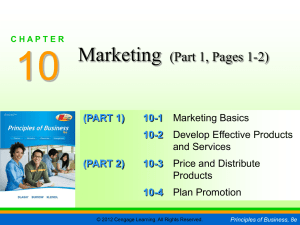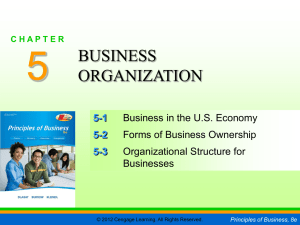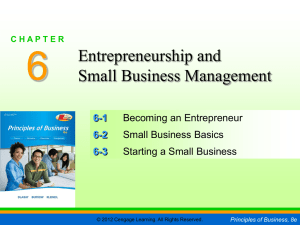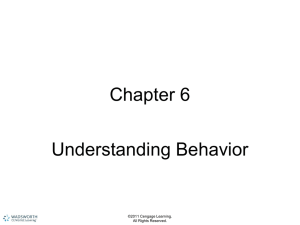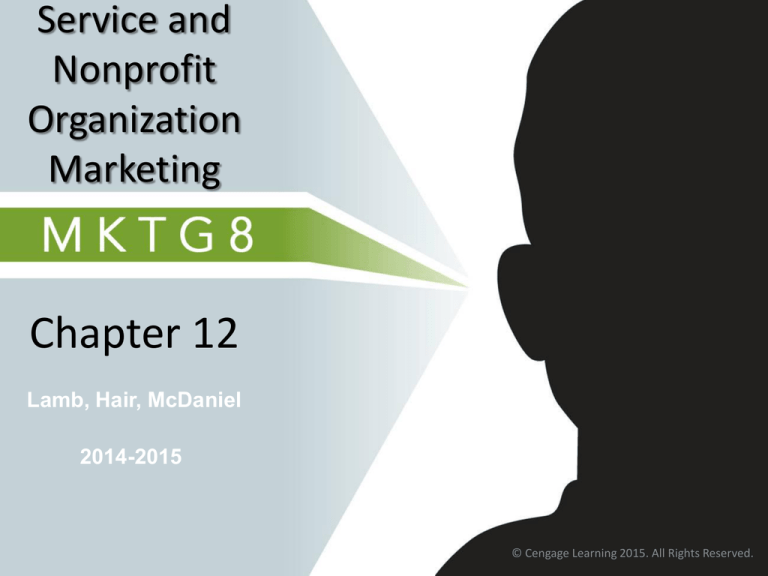
Service and
Nonprofit
Organization
Marketing
Chapter 12
Lamb, Hair, McDaniel
2014-2015
© Cengage Learning 2015. All Rights Reserved.
1
Discuss the importance of services to the
economy
2
Discuss the differences between services
and goods
3
Describe the components of service quality
and the gap model of service quality
4
Develop marketing mixes for services
© 2015 by Cengage Learning Inc. All Rights Reserved.
2
5
Discuss relationship marketing in services
6
Explain internal marketing in services
7
Describe nonprofit organizational
marketing
8
Discuss global issues in services
marketing
© 2015 by Cengage Learning Inc. All Rights Reserved.
3
The Importance of Services
Discuss the importance
of services to the
economy
1
4
© 2015 by Cengage Learning Inc. All Rights Reserved.
The Importance of Services
Service industries accounted for
68 percent of U.S. GDP in 2012.
Services involve:
• Deeds
• Performances
• Efforts
1
© 2015 by Cengage Learning Inc. All Rights Reserved.
5
How Services Differ from Goods
Discuss the differences
between services and
goods
2
6
© 2015 by Cengage Learning Inc. All Rights Reserved.
How Services
Differ from Goods
Intangible
Inseparable
No physical object makes it hard to
communicate benefits.
Production and consumption are
simultaneous, meaning the
consumer takes part in production.
Services depend on their
Heterogeneous employees for quality, which makes
consistency difficult to achieve.
Perishable
Services cannot be saved, and it is
challenging to synchronize supply
and demand.
2
© 2015 by Cengage Learning Inc. All Rights Reserved.
7
When Services are Assessed
• Search quality: More often
applied to goods, assessed
before purchase
• Experience quality: Assessed
after purchase
• Credence quality: Assessed only
with appropriate knowledge.
2
© 2015 by Cengage Learning Inc. All Rights Reserved.
8
Service Quality
Describe the
components
of service quality
and the gap model
of service quality
3
9
© 2015 by Cengage Learning Inc. All Rights Reserved.
Components of Service Quality
Reliability
The ability to perform the
service right the first time.
Responsiveness
The ability to provide
prompt service.
Assurance
The knowledge and courtesy
of employees.
Empathy
Caring, individualized
attention to customers.
Tangibles
The physical evidence
of the service.
3
© 2015 by Cengage Learning Inc. All Rights Reserved.
10
Exhibit 12.1
Gap Model of Service Quality
3
11
Marketing Mixes for Services
Develop marketing mixes
for services
4
12
© 2015 by Cengage Learning Inc. All Rights Reserved.
Product Strategies
for Services
Service as a
Process
Core and
Supplementary
Customization/
Standardization
Service
Mix
4
© 2015 by Cengage Learning Inc. All Rights Reserved.
13
Service as a Process
People
Processing
Possession
Processing
Mental Stimulus
Processing
Information
Processing
4
© 2015 by Cengage Learning Inc. All Rights Reserved.
14
The Service Offering
Core
Service
The most basic benefit the
consumer is buying.
Supplementary
Service
A group of services that
support or enhance the
core service.
4
© 2015 by Cengage Learning Inc. All Rights Reserved.
15
Customization/Standardization
Mass
Customization
A strategy that uses
technology to deliver
customized services
on a mass basis.
4
© 2015 by Cengage Learning Inc. All Rights Reserved.
16
The Service Mix
Determine which new services to
introduce
Determine the target market
Decide which existing services to
maintain and which to eliminate
4
© 2015 by Cengage Learning Inc. All Rights Reserved.
17
Place (Distribution) Strategy
Convenience
Number of outlets
Direct or indirect
distribution
Location
Scheduling
4
18
© 2015 by Cengage Learning Inc. All Rights Reserved.
Promotion Strategy
Stress tangible cues
Use personal information
sources
Create a strong
organizational image
Engage in postpurchase
communication
4
© 2015 by Cengage Learning Inc. All Rights Reserved.
19
Price Strategy
Pricing Challenges for Services
Define the unit of service
consumption
Determine if multiple elements
are “bundled” or priced
separately
4
© 2015 by Cengage Learning Inc. All Rights Reserved.
20
Pricing Objectives
Revenue-Oriented
Pricing
Maximize the surplus of
income over costs
OperationsOriented
Pricing
Match supply and demand
by varying price
PatronageOriented
Pricing
Maximize the number of
customers by varying price
4
© 2015 by Cengage Learning Inc. All Rights Reserved.
21
Relationship Marketing in Services
Discuss relationship
marketing in services
5
22
© 2015 by Cengage Learning Inc. All Rights Reserved.
Relationship
Marketing in Services
3
Structural
Social
Financial
Creating valueadded services
not available
elsewhere
2
Social
Financial
Design services
to meet
customer needs
1
Financial
Pricing
incentives
5
© 2015 by Cengage Learning Inc. All Rights Reserved.
23
Internal Marketing in Service Firms
Explain internal
marketing in services
6
24
© 2015 by Cengage Learning Inc. All Rights Reserved.
Internal Marketing
Treating employees as
customers and
developing systems and
benefits that satisfy their
needs.
6
© 2015 by Cengage Learning Inc. All Rights Reserved.
25
Nonprofit Organization Marketing
Describe nonprofit
organization marketing
7
26
© 2015 by Cengage Learning Inc. All Rights Reserved.
Nonprofit Organization
An organization that exists to achieve some
goal other than the usual business goals of
profit, market share, or return on investment.
• Governments
• Museums
• Theaters
• Schools
• Churches
7
© 2015 by Cengage Learning Inc. All Rights Reserved.
27
Nonprofit Organization
Marketing
Market intangible products
Shared
Characteristics
with
Service
Organizations
Production requires
customer’s presence
Services vary greatly
Services cannot be stored
7
© 2015 by Cengage Learning Inc. All Rights Reserved.
28
Nonprofit Organization
Marketing Activities
Identify desired customers
Specify objectives
Develop, manage, eliminate programs
and services
Decide on prices
Schedule events or programs
Communicate their availability
7
© 2015 by Cengage Learning Inc. All Rights Reserved.
29
Unique Aspects of Nonprofit
Organization Marketing Strategies
• Setting of marketing objectives
• Selection of target markets
• Development of marketing mixes
7
© 2015 by Cengage Learning Inc. All Rights Reserved.
30
Objectives
Provide services that respond to the
wants of:
Users
Payers
Appointed
officials
Donors
Media
Politicians
General Public
7
© 2015 by Cengage Learning Inc. All Rights Reserved.
31
Target Markets
Apathetic or
strongly opposed
targets
Pressure to adopt
undifferentiated
segmentation
Unique Issues
of Nonprofit
Organizations
Complementary
positioning
7
© 2015 by Cengage Learning Inc. All Rights Reserved.
32
Product Decisions
Distinctions between
Business and Nonprofit Organizations
Benefit complexity
Weak or indirect benefit strength
Low involvement
7
© 2015 by Cengage Learning Inc. All Rights Reserved.
33
Promotion Decisions
Professional volunteers
Sales promotion activities
Public service advertising
7
© 2015 by Cengage Learning Inc. All Rights Reserved.
34
Pricing Decisions
Pricing objectives
Nonfinancial prices
Characteristics
Distinguishing
Pricing Decisions
of Nonprofit
Organizations
Indirect payment
Separation between
payers and users
Below-cost pricing
7
© 2015 by Cengage Learning Inc. All Rights Reserved.
35
Global Issues in Services Marketing
Discuss global issues
in services marketing
8
36
© 2015 by Cengage Learning Inc. All Rights Reserved.
Global Issues in
Services Marketing
• The U.S. is the world’s largest
exporter of services.
• The marketing mix must
reflect each country’s cultural,
technological, and political
environment.
8
© 2015 by Cengage Learning Inc. All Rights Reserved.
37
Chapter 12 Video
Pepe’s Pizzeria
Pepe’s is a family owned and operated pizzeria in
Connecticut. The original Pepe earned the
nickname “Old Reliable” for his customer service,
and his grandchildren carry out that value today.
This video discusses the various ways that Pepe’s
Pizzeria works to provide great, consistent service
and why it is important.
CLICK TO PLAY VIDEO
38
© Cengage Learning Inc. 2015. All Rights Reserved.
Part 3 Video
Scripps Networks Interactive
Product Decisions
Scripps Networks Interactive is a media
company that operates popular channels such
as Food Network, DIY, and other lifestyle
channels. In this video, employees discuss
how Scripps manages and develop their new
cross-platform products, such as social media
and apps for mobile devices.
CLICK TO PLAY VIDEO
39
© Cengage Learning Inc. 2015. All Rights Reserved.


